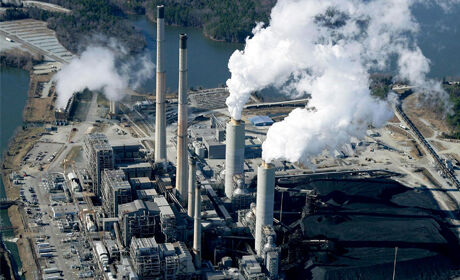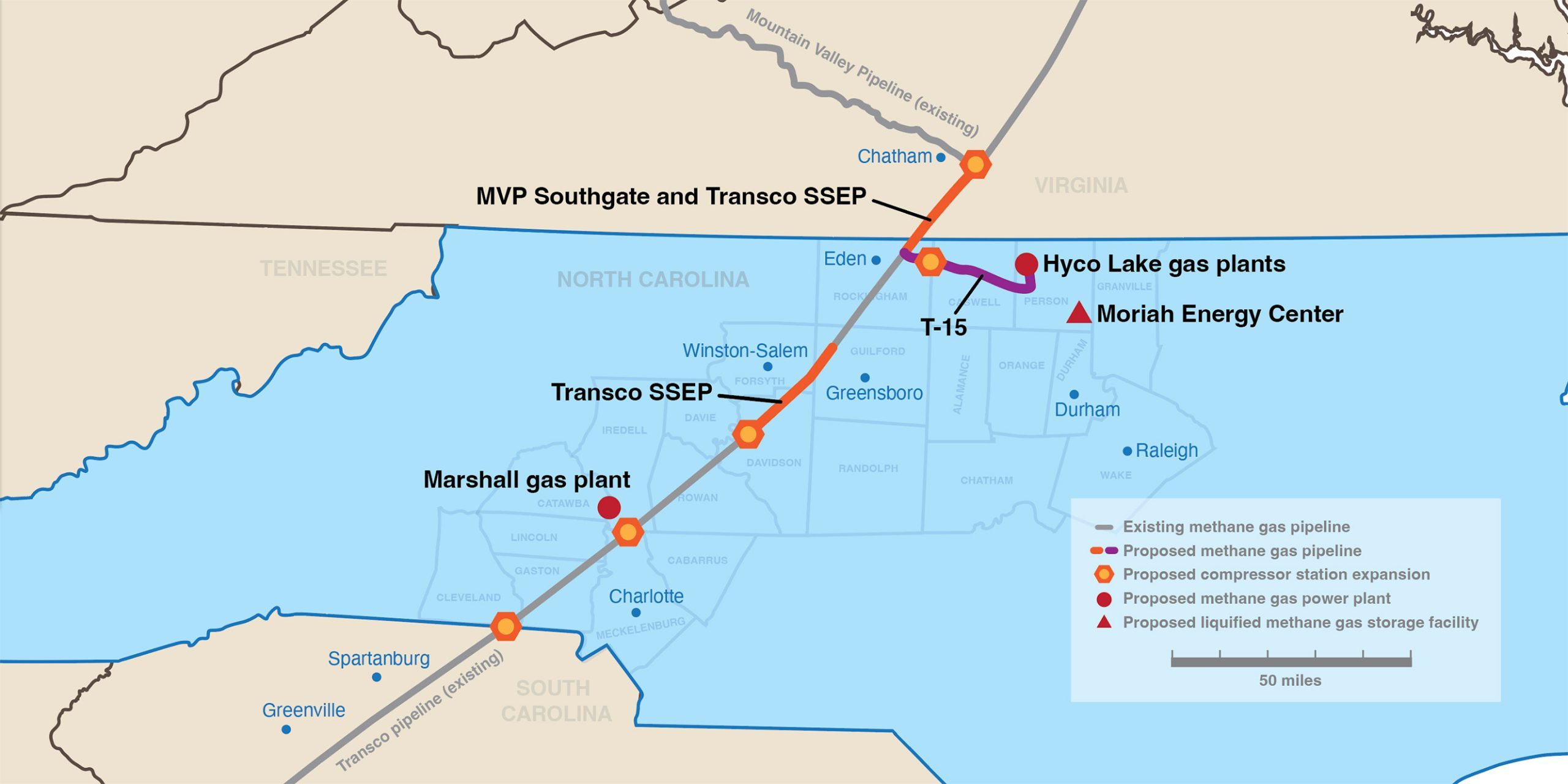We want our families to have the freedom to drink clean water, breathe safe air and live in healthy communities, but plans for a major buildout of methane gas infrastructure are putting that at risk. Corporations including Duke Energy, Dominion Energy, Mountain Valley Pipeline and Williams Companies want to build massive and expensive methane gas pipelines and gas-fired power plants for profit at the expense of our land and environment. But we have a say in how we power our homes and businesses, and we can move toward a clean and affordable energy system instead.
Across North and South Carolina, Duke Energy has proposed building nearly 9 gigawatts of new gas power plants by 2035. Experts say this is one of the largest planned expansions of new gas plants in the country. Ironically, Duke has proposed this investment in new gas plants as part of this year’s Carbon Plan — a plan that is intended to reduce the state’s carbon emissions.This buildout of methane gas would mean Duke entirely failing to meet the timeline for cutting pollution set by bipartisan state law.
Duke is moving in the wrong direction— 9 gigawatts is almost three times as much gas as it proposed in its last Carbon Plan. The industry likes to use the phrase “natural gas” to make it sound like this gas is harmless, but it’s the opposite. Building new methane gas is counterproductive to the state’s climate goals — methane is a climate-altering pollutant that is more than 80 times as potent as carbon dioxide over 20 years.
In addition to Duke’s plans, Williams Companies wants to build a 54-mile pipeline and associated compressor stations through North Carolina along its Transco system. This pipeline will carry a massive amount of fracked gas — the emissions from this pipeline would be equal to adding 6.5 million cars to our roads!

Web of Proposed Methane Gas Projects
- New methane gas power plant at Hyco Lake in Person County (Duke Energy): Construction of a new methane gas plant near the site of the existing coal plant on Hyco Lake in Person County.
- MVP Southgate (Equitrans Midstream Partners): An extension of Mountain Valley Pipeline to bring gas from Virginia into North Carolina. Equitrans cannot begin construction until it receives permits that it is missing. PSNC Energy (a Dominion Energy subsidiary) and Duke Energy would buy the pipeline’s gas.
- T15 Reliability Project (Dominion Energy): A 45-mile pipeline from Eden (the terminus of the proposed MVP Southgate) to Hyco Lake. Would be used to transport gas to the proposed Hyco Lake methane gas power plant.
- Moriah Energy Center (Dominion Energy): A liquified natural gas storage facility on 480 acres of land in southeastern Person County previously zoned as a rural conservation district.
- Transco’s Southeast Supply Enhancement Project (Williams Companies): A nearly 55-mile pipeline through Virginia and North Carolina with additional compressor units to expand existing capacity. This would be the largest pipeline proposed in this area in the last 10 years.
The high costs of Duke’s gas plans:
The high costs of Duke’s gas plans: Everyone in North Carolina would bear the burden of financing Duke’s proposed gas projects through higher utility bills. Expensive methane gas has been a driver of high electricity bills in recent years. In fact, increases in fuel prices, such as methane gas, account for 67% of the increase in residential electricity rates in Duke Energy Carolinas territory since 2017. Fuel prices are passed on to customers, so new gas plants put customers at risk for high energy bills driven by spikes in gas prices.
Duke’s latest projections indicate rate increases that are 74% higher than previously forecasted for Duke Energy Carolinas’ network, and 39% more for Duke Energy Progress’ network by 2033. This is on top of a 14.6% rate hike across three years that the North Carolina Utilities Commission approved in late 2023. Duke’s methane gas expansion plans will hit residents hard — especially low-income households that tend to spend a higher portion of their income on energy bills.
The costs of this gas buildout are especially unnecessary considering how affordable renewable energy sources have become. One study shows that clean, renewable energy sources are cheaper than other proposed gas plants when taking full advantage of the tax credits in the Inflation Reduction Act. Another report found that Duke could save hundreds of millions of dollars by 2030 if it focused more on solar and battery storage.

Key points
-
Gas reliability concerns: Across the Eastern U.S., methane gas plant failures accounted for 63% of lost power during Winter Storm Elliot, while solar and wind were responsible for only 1% and 4%, respectively. This is not an anomaly — during five recent extreme winter weather events across the past 12 years, gas plants accounted for the majority of failed capacity.
-
Community health concerns: Generating electricity from methane gas produces pollutants called nitrogen oxides. Exposure to high concentrations of nitrogen oxides can cause asthma, respiratory infections and heart damage. Additionally, nitrogen oxides react with other airborne chemicals to form particulate matter and ozone. Ozone exposure can cause various respiratory complications, while particulate matter affects the lungs and the heart, potentially leading to heart attacks, impaired lung function and premature death.
-
Pipelines and gas infrastructure: Methane gas power plants also require pipelines and compressor stations to transport the gas, which introduce various public health hazards, including the contamination of local drinking water, air pollution, degradation of soil quality resulting in reduced crop yields, and the threat of pipeline explosions and fires. Additionally, hydraulic fracturing, or fracking, is used to extract methane gas from underground. This process also causes air pollution and water contamination, leading to negative health effects. Counties across the U.S. with higher concentrations of socially vulnerable communities (such as Native communities, people of color, rural communities and people with low incomes) have significantly higher pipeline densities than counties with fewer socially vulnerable residents.

